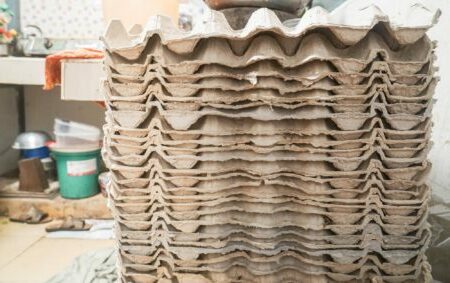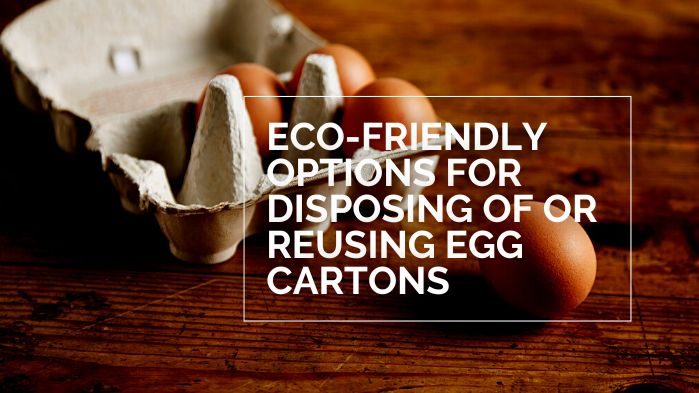Egg cartons can be recycled. However, the recycling process for these cartons can vary depending on the material they are made of and the recycling facilities in your area.
Some egg cartons are made of paper and can be recycled with other paper products, while others are made of foam or plastic and may need to be recycled differently. It’s a good idea to check with your local recycling center to see their specific guidelines for recycling egg cartons.
How to Recycle Egg Cartons
Here are some general steps for recycling egg cartons:
- Check the material: Egg cartons can be made of paper, foam, or plastic. Knowing the material of your carton will help you determine the best way to recycle it.
- Clean the carton: Remove any remaining eggs or debris from the carton. It’s a good idea to give the carton a quick rinse with water to remove any dirt or residue.
- Break down the carton: If your egg carton is made of paper or foam, flatten it to save space in your recycling bin. If it is made of plastic, you may need to leave it in its original shape to make it easier to recycle.
- Check with your local recycling center: Each recycling center has guidelines for what materials they will accept. Contact your local center to find out if they take egg cartons and, if so, how they should be prepared for recycling.
- Place the carton in your recycling bin: Once you have confirmed that your local recycling center accepts egg cartons, place the cleaned and prepared carton in your recycling bin. If you’re unsure where your nearest recycling center is, you can use an online tool or contact your local waste management company for more information.

Where to Recycle Egg Cartons
The best place to recycle egg cartons is a local recycling center that accepts them. Contact them directly to find out if your local recycling center takes egg cartons, or check their website for more information. Some recycling centers may have specific guidelines for how the cartons should be prepared for recycling, so it’s a good idea to check with them before you bring them in.
If you don’t have access to a local recycling center that accepts egg cartons, or if you are not sure where to recycle them, you can try the following options:
- Contact your local waste management company: Your local waste management company may be able to provide information on where to recycle egg cartons in your area.
- Use an online recycling tool: Several online tools can help you find recycling centers near you. Enter your zip code and the item you want to recycle (in this case, “egg cartons”), and the tool will provide a list of nearby locations that accept them.
- Check with your grocery store: Some grocery stores have recycling programs for egg cartons and other items. You can ask the store if they have a program or other options for recycling egg cartons.
Grocery Stores With Recycling Programs
Several grocery stores have recycling programs for various items, including egg cartons. Here are a few examples:
- Whole Foods: Whole Foods has partnered with TerraCycle, a company that recycles hard-to-recycle materials. Through this partnership, Whole Foods offers in-store recycling for various items, including egg cartons.
- Wegmans: Wegmans has a recycling program that includes various items, including egg cartons. The store also has recycling stations in the parking lot for articles that cannot be recycled.
- Safeway: Safeway has a recycling program that includes egg cartons and other items. The store also offers a recycling bin for cardboard and paper products in the parking lot.
- Kroger: Kroger has a recycling program that includes egg cartons and other items. The store also has recycling bins for cardboard and paper products in the parking lot.
Remember that recycling programs vary by location, so it’s a good idea to check with your local store to see what they offer.
Different Types of Egg Cartons
There are several different types of egg cartons, each with unique features and benefits. Here are a few examples:
- Paper egg cartons: These are made of paper and are a more environmentally friendly option. They are also more easily recyclable than other types of cartons.
- Foam egg cartons: These are made of foam and are lightweight and affordable. However, they are not as easily recyclable as paper cartons.
- Plastic egg cartons: These are made of plastic and are more durable than paper or foam cartons. They are also more resistant to moisture and are easier to clean. However, they are not as easily recyclable as paper or foam cartons.
- Biodegradable egg cartons: These are made of biodegradable materials designed to break down and decompose in the environment. They are more environmentally friendly but may not be as widely available as other cartons.
- Egg boxes are similar to egg cartons but are designed to hold eggs in a horizontal position rather than a vertical position. They are commonly used in Europe and available in various materials, including paper, foam, and plastic.
How to Reuse Egg Cartons
There are many creative ways to reuse egg cartons for practical purposes and fun projects. Here are a few ideas:
- Use egg cartons as seed starters: Cut off the top of the egg carton and fill the individual cups with potting soil. Plant your seeds according to the instructions on the seed packet, then place the carton in a sunny spot. Once the seedlings have grown enough, you can plant them in your garden or pots.
- Make an egg carton wreath: Cut the cups out of an egg carton and paint them in various colors. Glue them into a foam wreath form to create a colorful and unique wreath.
- Use egg cartons as planters: Cut the cups out of an egg carton and fill them with soil. Plant small flowers or herbs in the cups and place them in a sunny spot.
- Use egg cartons as compost: Break down the carton and add it to your compost bin. The carton will break down over time and provide nutrients to your plants.
- Make an egg carton puzzle: Cut out the cups from an egg carton and mix them up. Challenge your kids (or yourself) to put the cups back together to create a complete egg carton.
Egg Carton Composting
Egg cartons can be added to a compost pile or bin as a carbon source, also known as “brown matter.” When composting, it’s important to balance carbon-rich materials (brown matter) and nitrogen-rich materials (green matter). Examples of brown matter include egg cartons, cardboard, and dry leaves, while green matter includes grass clippings, food scraps, and garden waste.
To compost egg cartons, break them down into small pieces and mix them into your compost bin or pile. Mixing the cartons with other materials is a good idea to help them break down more quickly. Egg cartons may take longer to break down than other materials, but they will eventually decompose and provide nutrients to your soil.
Remember that some egg cartons, such as those made of plastic or foam, may not be suitable for composting. It’s a good idea to check with your local composting facility to see what materials they will accept.
Conclusion
Egg cartons can be recycled or reused in a variety of ways. They can be recycled at local recycling centers or reused for projects such as seed starters, planters, and crafts.
Egg cartons can also be added to a compost bin as a carbon source. It’s important to check with your local recycling center or composting facility to see what materials they will accept and how they should be prepared. We can help reduce waste and protect the environment by properly disposing of or reusing egg cartons.

